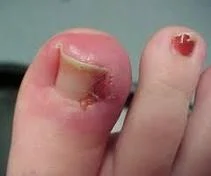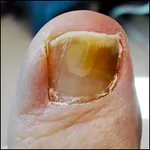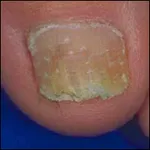Fungus Toenail Laser Tx
FUNGAL NAIL LASER TREATMENT CLINIC
DOWNTOWN TORONTO FOOT CLINIC
NEW LASER TREATMENT FOR TOENAIL FUNGUS
Our foot clinic has invested in a fungal laser for the treatment of fungal toenails. What sets this laser apart is that 2 seperate and unique lasers are uses ineach treatment. First the q-switched laser is used which destroys the fungal spores. Then the yag 1064 laser is used on all 10 toes to kill the fungal infection or mycelium.
A preliminary study performed in roseville california indicates that up to 75-80% of patients with mild to moderate onychomycosis or fungal toenails will experience a significant improvement following treatment.
The laser is an alternative to topical medications such as pen lac, which has limited effeciency, and oral antifungal pills such as lamisil, terbinifine or sporonox which have associated serious side effects such as liver and kidney damage. Our foot clinic never recomends oral medications for fungal toenail.
With our laser, there is very little discomfort, anaesthetic is unnecessary and you may walk and resume normal activities immediately after your toenail infection treatment.
Please call our foot clinic at 416-465-8737 today to find out how our services can help you with your toe nails.

Fungal nails refers to any number of fungal nail infections that can occur on the foot. Since fungal nails are usually more resistant and more difficult to treat than Athlete's Foot, topical or oral antifungal medications may be prescribed. Note: Please consult a physician before taking any medications. Permanent nail removal is another possible form of treatment for tenacious fungal nails.
Preventing Fungal Nail Infections
After a fungal nail infection has cleared up, take steps to prevent the infection from recurring. Keeping fungi at bay will help prevent a fungal infection of the skin from reinfecting the nail. Before bed, thoroughly wash and dry your feet, and apply a nonprescription antifungalantifungal cream to the entire foot from the ankle down. Use the cream every night, then gradually apply it less often. Keep your feet dry. Dry feet are less likely to become infected. Apply powder to your dry feet after you take a shower or bath.
Other suggestions for preventing fungal nails include:
- Don't share nail clippers or nail files with others.
- Don't share shoes or socks with others.
- Try not to injure your nail, such as by cutting it too short (trauma to the nail may lead to infections).
- Wear dry cotton socks and change them two or three times a day if necessary.
- Wear dry shoes that allow air to circulate around your feet (tight, enclosed, moist shoes contribute to fungal toenail infections).
- Wear shower sandals or shower shoes when you are at a public pool or shower.
Prevention
Follow basic foot care guidelines and, more than likely, you can head off most common foot fungus problems.
- Do your toenails appear yellow, brittle or thickened?
- Do you avoid swimming at the beach or pool because of the appearance of your toenails?
- Are you embarrassed when you go barefoot because of your thick yellow toenails?


If you answered yes to these questions you probably have a toenail fungus infection.
The good news is you no longer have to be embarrassed by your unsightly toenails!!
ACADEMY FOOT AND ORTHOTIC CLINICS is now offering Laser Nail Treatment....the latest technology in the treatment of thick, unsightly, yellow nails.
The Q-Clear Q-Switch™ laser treatment, shown in the video below, can effectively and efficiently rid you of ugly unsightly toenail infections in as little as one treatment, depending on the severity of the condition. The mid-infrared laser wavelength penetrates the nail and the nail bed, eliminating the destructive nasty infection thus allowing your own body to revitalize your own nail naturally as it grows out clean, clear and healthy.
Laser toenail treatment studies are very positive and to date no known side effects have been found. Laser nail fungus treatments have success rates of around 80% in clinical trials and are a safe alternative to oral medications that can have side effects.
What is nail fungus?
It is estimated that up to 14% of Canadians are affected by toenail fungus. Nail fungus is made up of tiny organisms that infect and grow under the nails, as the space under the nails provides a good environment for the fungus to grow. An injury to the toenail from tight shoes or damage from dropping a heavy object on a toe can lead to a fungus infection as the injury can cause the nail to separate from the nail bed. This separation creates an ideal place for the fungus to start growing. Nail fungus is most commonly found in the toenails because the socks and shoes we wear provide a dark, moist place that is suitable for fungal growth. Fungus initially starts out as a yellow or white spot or streak on the nail and if left untreated will eventually infect the entire nail and can also spread from toenail to toenail and from person to person.
How do you get nail fungus?
Everyone is at risk for developing nail fungus however it is more common in:
- People who are elderly or who have poor health.
- People who go barefoot in public places such public showers, gyms and swimming pools.
- People that get pedicures in spas that don’t sterilize their instrument or use the nail polishes on multiple clients.
- People that have a history of fungal skin infections of the feet (athletes foot)
- People who have hot, sweaty or moist feet
How do I know if I have a fungus infection in my toenails?
Generally fungal infections of the toenails cause the toenails to become thick, flaky and turn yellow, white or brown. Fungal toe nails will often have a foul smell and will generally accumulate debris under the nail. In severe cases the nail can separate from the nail bed and fall off.
Laser Toenail Fungal Treatment
Am I a good candidate for laser fungal nail treatment?
Generally, the longer you have had a toenail fungus infection the worse it is and the harder it is to resolve. Laser fungal nail treatment is not indicated in people with the following:
- Pregnancy
- Presence of skin cancers
- Peripheral neuropathy ( numbness of loss of feeling in the feet)
- Peripheral Vascular Disease ( poor circulation )
How does the laser treatment work?
The laser produces 1064nm laser light energy that is specifically absorbed by water and water associated with collagen as well as being focused on the colour red. Collagen is a major component in the tissues of the nail and nail growth area as well as the skin. The laser is so sophisticated that it can detect and reach the proper temperature leading to elimination of the toenail infection. The treatment then stops immediately without any pain or discomfort.
How long does the laser treatment take?
Depending on the severity of the infection the treatment can take up to 15 minutes and generally requires FIVE treatment sessions 4 TO 6 WEEKS apart.
Is the treatment painful?
The laser provides a comfortable, safe, controlled treatment by having little or NO THERMAL effect (heat) on the skin, nail and nail bed. You should have no pain or discomfort during the treatment however some people feel a warm tingling sensation.
Will I be able to walk after my laser toenail treatment?
Yes you will be able to walk after the treatment.
Is Laser toenail treatment safe and are there any side effects?
The studies undertaken so far show absolutely no side effects from receiving laser treatment. Oral medications or pills designed to treat fungus have been available for many years however, these medications have potential side effects on both the kidneys and liver. The laser treatment does not have these unwanted side effects.
Does laser toenail treatment work?
Yes. Laser treatments for unsightly toenail infections have a two plus year track record. Clinical studies show that over 80% of patients who have laser nail treatment show significant improvement in the appearance of their nails.
How soon will I see results after my toenail laser treatment?
On average, a toenail will replace itself every 9 -12 months. Healthy new nail growth will be visible within the first 2 months as your nail continues to grow following the laser treatment. As part of the treatment plan we highly recommend the use of a topical anti-fungal agent to prevent cross contamination and the use of an anti-fungal shoe spray to reduce the risk of re- contamination.
Does the laser toenail treatment permanently cure my fungus?
Fungus is an opportunistic organism. In other words it is always around us in our environment and if the right conditions are available (warmth and moisture) it may grow. The procedure will treat the infection you currently have but will not prevent you from getting it again in the future. You will need to take precautions in the future to prevent reoccurrences.
How to prevent nail fungus
- Wear flip flops or rubber sandals when you use public facilities such as gym showers, change rooms and swimming pools. Nail fungus is contagious and someone with an infection may have walked in the area before you.
- Wear shoes made out of breathable materials such as canvas or leather.
- Wear shoes that fit properly and don’t pinch your toes. Damaged toenails provide a good place for fungus to grow.
- Use anti-fungal sprays and powders in your shoes or on your feet to eliminate any fungus that might be present. Avoid using the same shoes everyday to give them time to air dry especially if you sweat a lot. If you sweat excessively change your socks a couple of times a day.
- Do not cover up an existing nail fungus with nail polish. Ignoring the fungus will only give it more time to get worse.
- Wash your feet regularly with soap and dry well especially between the toes. Fungus grows in moist damp places.
- If you get a pedicure or manicure from a salon or spa make sure they sterilize their instruments after every customer. Sterilization in a liquid is not adequate. They should be using steam sterilizers. Alternately, you could purchase your own set of foot care instruments and bring your own nail polish.
- See a chiropodist if you suspect you have an infection. Early treatment of fungus is critical.





